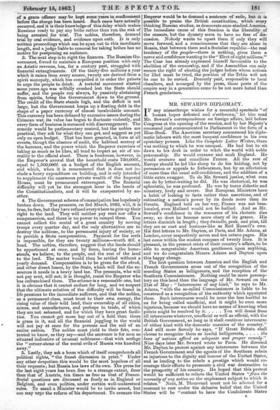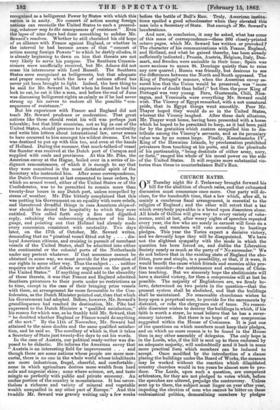MR. SEWARD'S DIPLOMACY.
I T any misanthrope wishes for a mournful spectacle "of human hopes defeated and o'erthrown," let him read Mr. Seward's correspondence on foreign affairs, laid before Congress at the opening of the session, and by her Majesty's command just communicated to Parliament in the form of a Blue-Book. The American secretary commenced his diplo- matic labours with the most buoyant confidence in his own epistolary powers. Like the Complete Letter Writer, there was nothing to which he was unequal. He had but to sit down to his desk in order to witch the world with noble penmanship. He would overawe and snub England. He would overawe and conciliate France. All the rest of Europe should be led like sheep to do his bidding, not by persuasion or appeals to forbearance, but- by an affectation of more than the usual self-confidence, and the addition of a little extra swagger. To do Mr. Seward justice, what man can do by letter-writing he did. He was rhetorical, he was aphoristic, he was profound. He was by turns didactic and minatory, lively and severe. But European Ministers have a habit of looking to facts rather than assertions, and of estimating a nation's power by its deeds more than its threats. England held on her way, France was not bam- boozled, even Holland would not be bullied. And as Mr.
Seward's confidence in the resources of his rhetoric dies away, so does he become more chary of its graces. His letters diminish in length ; they dwindle, peak, and pine, till they are as curt and business-like as Earl Russell's own. His first letters to Mr. Dayton, at Paris, and Mr. Adams, at London, cover respectively seven and ten octavo pages. His last come within the modest compass of twenty lines. It is pleasant, in the present crisis of their country's affairs, to be able to congratulate American gentlemen upon anything, and we do congratulate Messrs. Adams and Dayton upon this happy change. The first question between America and the English and French Governments arose out of the recognition of the seceding States as belligerents, and, the reception of the Southern Commissioners. Nothing could be more peremp- tory on this head than the language of Mr. Seward on the 21st of May : "Intercourse of any. kind," he says to Mr. Adams, "with the so-called Commissioners is liable to be construed as a recognition of the authority which appointed them. Such intercourse would be none the less hurtful to us for being called unofficial, and it might be even more injurious, because we should have no means of knowing what points might be resolved by it You will desist from all intercourse whatever, unofficial as well as official, with the British Government, so long as it shall continue intercourse of either kind with the domestic enemies of the country." And still more fiercely he says, "If Great Britain shall choose to recognize them as lawful belligerents, . . . . the laws of nations sford an adequate and proper remedy." Nine days later Mr. Seward wrote to Paris. He directed Mr. Dayton to protest against any intercourse between the French Government and the agents of the Southern rebels as injurious to the dignity and honour of the United States, and as lending to the rebels a prestige which would en- courage their efforts to prosecute a civil war destructive to the prosperity of his country. He hoped that this protest would be sufficient to relieve the United States "from the necessity of any action on the unpleasant subject to which it relates. Next, M. Thouvenel must not be allowed for a moment to rest under the delusive belief that the United States will be "content to have the Confederate States recognized as a belligerent Power by States with which this nation is in amity. No concert of action among foreign nations can reconcile the United States to such a proceed- ing, whatever may be the consequences of resistance." . Even the lapse of nine days had done something to subdue Mr. Seward's resolves. Whether he still cherished his old hope of an alliance with France against Pngland, or whether in the interval he had become aware of that "concert of action among foreign Powers" to which he darkly alludes, it is already beginning to dawn on him that threats are not very likely to serve his purpose. The Southern Commis- sioners were unofficially received, but Mr. Adams did not cease his intercourse with Lord Russell. The Southern States were recognized as belligerents, but that adequate and proper remedy which the laws of nations afford has never yet been brought to light. Indeed, the best thing to be said for Mr. Seward is, that when he found he had his leek to eat, he eat it like a man, and before the end of June was discussing belligerent rights as calmly as if he had never strung up his nerves to endure all the possible "con- sequences of resistance." But his experience with France and England did not teach Mr. Seward prudence or moderation. That great nations like these should resist his will was perhaps just tolerable ; but that little countries, not so big as one of the United States, should presume to practise a strict neutrality and write him letters about international law, never seems to have occurred to him amongst his wildest dreams. Yet he was destined to put up with this too, and even at the hands of Holland. During the summer, that much-talked-of vessel the Sumter was received at the Dutch port of Curacoa and supplied with coals and provisions. At this Mr. Pike, the American envoy at the Hague, boiled over in a series of in- dignant remonstrances, of which it is enough to say that they were conceived in the most dictatorial spirit of the Secretary who instructed him. After some correspondence, the Dutch Government at last consented to issue orders, by which no armed vessel, either of the United States or of the Confederates, was to be permitted to remain more than twenty-four hours in any Dutch port, unless compelled by stress of weather. Mr. Pike bitterly complained that this was putting his Government on an equality with mere rebels, and threatened dreadful things in case American ships-of- war should be denied the hospitality to which they were entitled. This called forth only a firm and dignified reply, rebuking the unbecoming character of his lan- gauge, and pointing out that Holland had already made every concession consistent with neutrality. Two days later, on the 17th of October, Mr. Seward writes, demanding that no "piratical vessel fitted out by . . . . dis- loyal American citizens, and cruising in pursuit of merchant vessels of the United States, shall be admitted into either the continental or the colonial ports of the Netherlands under any pretext whatever. If that assurance cannot be obtained in some way, we must provide for the protection of our rights in some other way. Thus the subject .. . . neither requires nor admits of debate or argument on the part of the United States." If anything could add to the absurdity of these threats, it was that France and England admitted Southern privateers to their ports under no restrictions as to time, except in the case of their bringing prize vessels with them, an arrangement far more favourable to the Con- federates, as the Dutch Minister pointed out, than that which his Government had adopted. Before, however, Mr. Seward's grandiloquence had reached its destination, Mr. Pike had expressed to the Dutch Minister a "qualified satisfaction," his reason for which was, as he frankly told Mr. Seivard, that "he doubted whether England or France would do anything of the sort." By the 11th of November, Mr. Seward had attained to the same doubts and the same qualified satisfac- tion, and he said so. The corollary of which is, that it takes a Secretary of State just twenty-five days to eat his words. In the case of Austria, our political ready-writer was dis- posed to be didactic. He informs the American envoy that "Austria is an interesting field for improvement . . . and though there are some nations whose people are more mer- curial, there is no one in the whole world whose inhabitants are more industrious, frugal, cheerful, and comfortable ; none in which agriculture derives more wealth from hard soils and ungenial skies ; none where science, art, and taste mingle so perfectly with public and private economy. An undue portion of the country is mountainous. It has never- theless a richness and variety of mineral and vegetable wealth unequalled in any other part of Europe." And this twaddle Mr. Seward was gravely writing only a few weeks before the battle of Bull's Run. Truly, American institu- tions spoiled a good schoolmaster when they elevated this man into a Secretary of State. But enough of Mr. Seward's lucubrations.
And now, in conclusion, it may be asked, what has come of this mass of correspondence—these 366 closely-printed octavo pages, which bli.. Seward has written or provoked ? The character of his communications with France, England, and Holland, and what he gained thereby, has been already sufficiently indicated ; Prussia, Austria, Belgium, Italy, Den- mark, and Sweden were amicable in their tone ; Spain was more anxious to annex St. Domingo quietly than to raise any new quarrel ; Russia was friendly, but desirous to see the differences between the North and South appeased. The King of Portugal's manner, when the American envoy as- sured him that the Union would be preserved, was "more expressive of doubt than belief;" but then the poor King of Portugal was very young. Peru, Guatemala, Chili, Nica- ragua, and Venezuela were everything Mr. Seward could wish. The Viceroy of Egypt remarked, with a not unnatural pride, that in Egypt things went smoothly. Poor Mr. Thayer hoped they would do so in the United States, whereat the Viceroy laughed. After these dark allusions, Mr. Thayer went home, having been presented with a horse which he hoped to be permitted to keep, as it had been paid for by the gratuities which custom compelled him to dis- tribute among the Viceroy's servants, and as its pecuniary value was by no means large. Finally, Kamehameha IV., King of the Hawaiian Islands, by proclamation prohibited privateers from touching at his ports, and in the plenitude of his partisanship, "being destitute of either army, navy, or forts," ranged the whole of his moral power on the side of the United States. It will require more substantial vic- tories than these to counterbalance Bull's Run.































 Previous page
Previous page